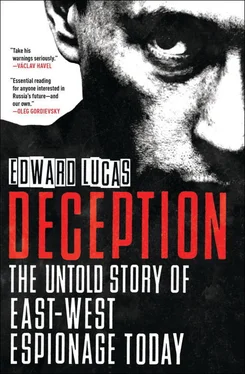In the Baltics American efforts centred on the charismatic (and entirely honourable) Lukša, who had returned from Lithuania deeply worried about KGB penetration of the resistance. In January 1949 America flew Lithuanian émigré leaders to Washington, DC, to sign a formal agreement with the CIA, backed by an annual grant of $40,000. Meanwhile the SIS-backed Lithuanians were falling deeper into the KGB’s grasp. From being unwittingly under Soviet control, they were now working hand-in-hand with the country’s occupiers. Despite warning signals – a failure to answer a trick question and a failed assassination attempt on SIS’s top Lithuanian in Stockholm – Britain failed to notice anything amiss. The CIA was misreading the signs too: Lukša’s final mission to Lithuania was unsuccessful, because the partisans were by now so weak that collecting intelligence, let alone fighting the Soviets, was difficult. Quite unfairly, the Americans worried that Lukša’s lacklustre reporting showed that he had been turned or betrayed. The British-backed agents seemed to be doing so much better. The outcome could hardly have been better for the KGB: the British suspected that the American operation was leaky; the Americans suspected the British. Carr flew to Washington to have it out with Rositzke. The exchange between the two Harrys ran as follows:
R: Do we know which of these operations is already under Russian control?
C: Ours isn’t.
R: How can you be so sure that your agent isn’t under control?
C: We’re sure.
R: But how can you be?
C: Because we’ve made our checks. Our group is watertight.
R: So’s ours, but one group is penetrated.
C: Harry, I think we know our business on this one. 22
Carr could hardly have been more wrong. Britain was making the biggest bungles imaginable, with a flawed concept, weak operational planning, poor assessment and sloppy compartmentalisation. Worse, the notetaker at this meeting was none other than Kim Philby. [53] ba After leaving SIS Philby worked briefly for my employer, the Economist , as our Beirut-based Middle East correspondent. Barbara Smith, then one of our Middle East editors, remembers his reporting as excellent but that she had to chivvy him over his lack of productivity. Shortly afterwards we found out the reasons, when he turned up in the Soviet Union.
The reaction that his account of this top-secret meeting aroused among his controllers in Moscow can only be imagined.
By 1949, the Baltic resistance was effectively over. Collectivisation of agriculture and the accompanying mass deportations had all but destroyed the partisans’ food supplies and support networks. Cruelty against those who continued to resist was extreme:
Extreme forms of torture, quartering, tongue-cutting, eye-gouging, burying heads down in ant hills, etc., were employed to break the fighters. Mutilated corpses were dumped in town squares – and reactions of passers-by were surreptitiously observed in an attempt to identify relatives and friends. 23
Western spymasters seemed quite unaware of the disaster. In the spring of 1951, SIS, with Swedish help, sent four new agents to the Latvian coast. Unbeknown to the spymasters in London, one was a traitor planted earlier by the KGB. SIS had prudently ordered the Estonian agent to head straight for his own country rather than make contact with the Latvian group. But nobody in the Estonian KGB was prepared to take the risk of allowing the SIS man to complete even the semblance of his mission there. Instead, they arrested him. He swallowed a cyanide capsule. His code name was ‘Gustav’ but his real name is unknown. In 1952 more SIS-trained agents came ashore, including one with some excellent forgeries of Soviet passports, which were of great interest to the KGB. With a proper crop of such documents to examine, they could see what errors or omissions to look for. At least according to the KGB museum in Moscow, one such telltale was the high quality of staples used to hold the documents together. In the Soviet Union, these were made of cheap iron which left traces of rust. Western forgeries used staples made with stainless steel. Even if the paper, cover, ink and stamps were perfect, the lack of rust and shiny steel fasteners were a lethal giveaway.
Undeterred, Rebane recruited more agents, speaking of the ‘holy duty’ of resistance to the occupiers. One such recruit was a hapless young man called Mart Männik. He had been working in a cotton mill in Preston in the north of England – one of the many displaced Estonians, Latvians and Lithuanians starting new lives in the West. Rebane told him:
A resistance organisation has been activated and is operating now, principally on the basis of the forest brothers who conduct an underground struggle against the Russian occupiers with the aim of restoring the Estonian Republic. For us, foreign Estonians, it is a holy duty to support this struggle in every way possible. Unfortunately, we do not have a link with the motherland so that at any price we need to create this… Therefore, we are forced to work together with the English, who on certain conditions set by themselves are ready to assist us materially.
The conditions are: obtaining every type of intelligence information concerning the Soviet Union. We must of course agree with these conditions, all the more so since this does not damage our endeavours, but on the contrary, it will be useful for us. So, the English have now created within their intelligence services a so-called Baltic Group… we are totally under their management… our only resource [is] brave and enterprising Estonian men who would be ready to carry out this difficult mission. 24
Männik agreed readily. Rebane explained that he would be posted to Estonia for a year to eighteen months. Equipped with four radios, codebooks, forged Soviet documents, weapons, 2,000 cartridges and 150,000 Soviet roubles, his group successfully landed in Latvia in late September 1951. By now the Estonian KGB was following the example of its Latvian counterparts. It housed the arrivals in an elaborate network of bunkers and safe houses, complete with ‘colleagues’ from the supposed resistance movement, including an old friend of Rebane’s who had been turned by the KGB. On 3 February Männik and his colleague were invited to a party in a Tallinn suburb where he was given drugged vodka and captured.
Despite the brilliance of Lukaševičs and his colleagues, the deception operation was endangered by the feebleness of the intelligence being gathered. Lukša had provided Sweden with extensive information about political and economic conditions 25and gave the CIA an excellent report about a secret radio installation. 26To keep the operation credible, Lukaševičs urgently needed to provide more real secrets. But in the paranoid world of Soviet intelligence nobody was willing to take that risk. For example when SIS wanted details of ships docking at the Latvian port of Ventspils, the Soviet defence ministry insisted that the data be deliberately understated. Lukaševičs protested: foreign vessels used the port too so the information could be cross-checked. If the estimates were too low, they would dent the operation’s credibility. But Moscow was adamant. Unsurprisingly, SIS analysts in London did notice problems with the data and sent a stern message along with some more demanding tasks.
Compounding the growing unease in some quarters was the absence of trouble. Some seasoned SIS officers had noted that American and British efforts in Ukraine, Albania and Romania had ended in dismal failure. Why was the Baltic operation so curiously successful? An SIS officer of Lithuanian extraction, John Ludzius, was one of those sounding the alarm. But the obsessively secretive Harry Carr, smugly over-confident despite his lamentable failures in the interwar years, enjoyed the personal backing of the then SIS chief, John ‘Sinbad’ Sinclair. Ludzius was posted to the Far East.
Читать дальше












